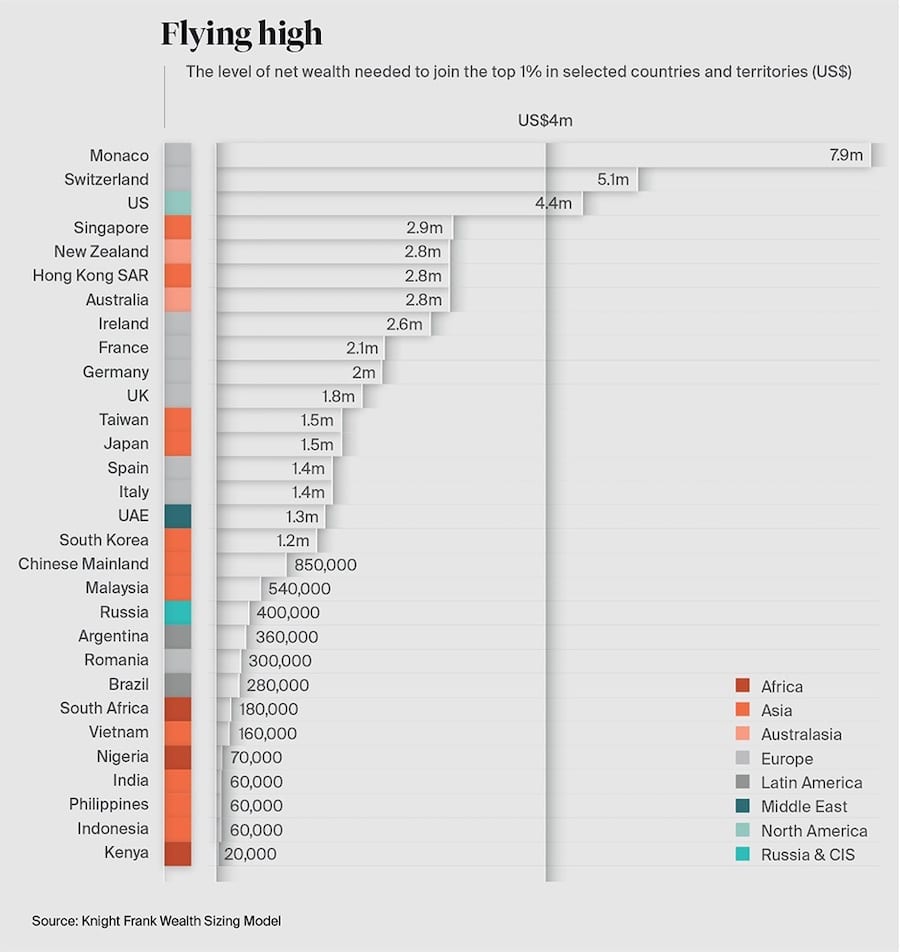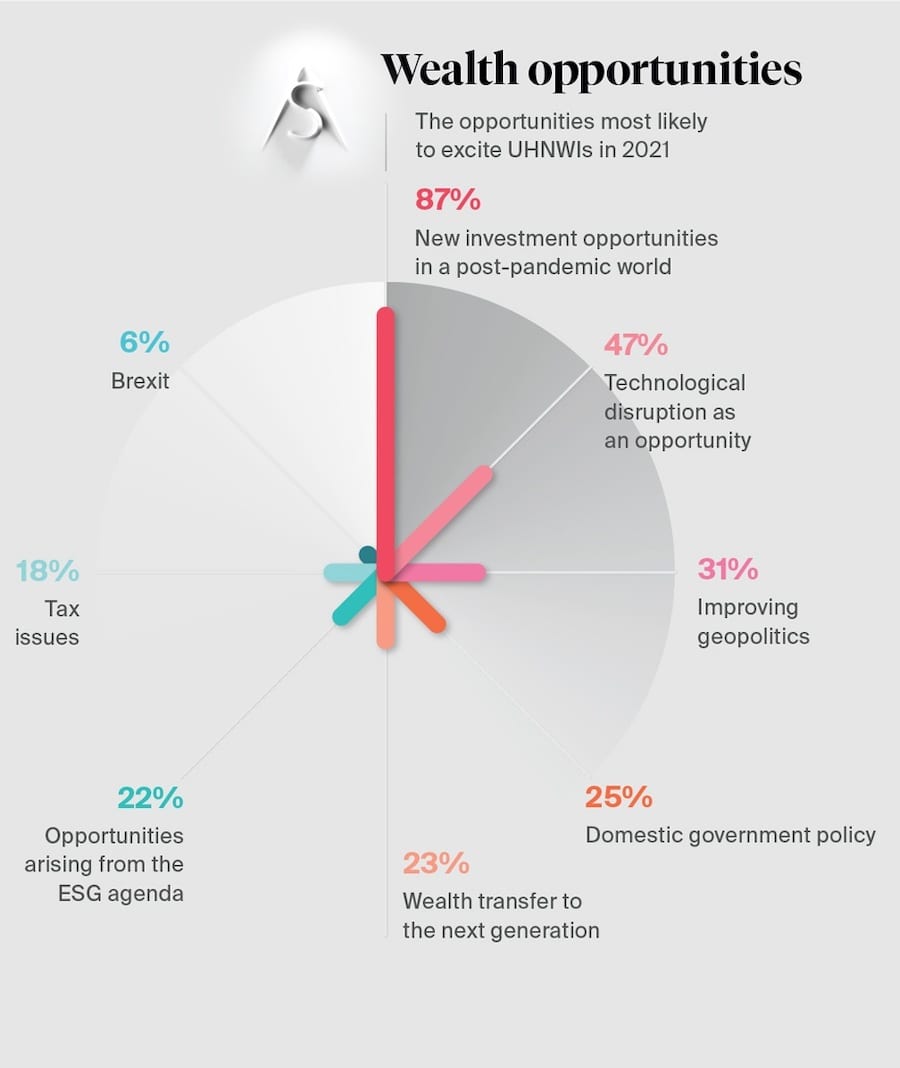How deep do your pockets need to be to join the wealthiest 1% in Monaco? What impact did Covid have on global wealth? What will the biggest influences on wealth creation be in 2021? We look at the latest Wealth Report to find out.
Each year for the past 15 years, Knight Frank releases its flagship publication The Wealth Report, considered important reading for ultra high net worth individuals (UHNWIs) across the globe and their advisers. In this article, we have identified some of the highlights of this year’s report.
You will be surprised
The top 1% is frequently referred to, but never really defined. That’s because the level of net wealth that marks the threshold for entering this rarefied community varies widely among different countries and territories.
Using the Frank Knight Wealth Sizing Model, it is possible to determine how much wealth an individual needs to get into the Principality’s branch of the 1% club.
According to Knight Frank’s definition, an ultra high net worth individual (UHNWI) is somebody whose wealth exceeds US $30 million.
Interestingly enough, it takes far less to enter the 1%.
The level of net wealth needed to join the top 1% in the Principality of Monaco is US $7.9 million (€6.5 million).
In second place is the home of the private bank, Switzerland, where US$5.1 million gains you access, followed by the US, which has the highest number of UHNWI residents. Here, US$4.4 million is your ticket to 1% status.

Impact of Covid on global wealth
With lower interest rates and more fiscal stimulus, asset prices have surged, driving the world’s UHNW population 2.4% higher over the past 12 months to more than 520,000.
While this was virtually one-third the rate of growth seen in 2019, it is still not what experts would have predicted in the first half of the year, given the impact of the virus.
Growth was seen across North America (+4%) and Europe (+1%), but it was Asia that saw the real upswing with 12%, followed closely by Australasia (+10%), the regions which were seemingly able to control the virus the best.
The expansion in wealth was not universal though, with a fall in the number of UHNWIs in Latin America (-14%), Russia (-21%) and the Middle East (-10%) as currency shifts and the pandemic undermined local economies.
“The rollout of vaccines at the start of 2021 is an extremely positive signal, and one that marks the beginning of a new economic cycle in a post-pandemic world,” said the authors of the Wealth Report.
Biggest influences on wealth creation in 2021
The Wealth Report assessed the biggest potential influences on wealth creation and preservation that individuals should be considering in 2021 and beyond. They identified these key areas.
New investments
The Covid-19 pandemic and its related closures, lockdowns and travel restrictions, have given people more time to reassess every element of their lives, including their businesses and investments. As a result, the number of new companies being set up is rising. “We are entering a new economic cycle and the prospects for wealth creation and growth are huge,” says David Bailin, Chief Investment Officer at Citi Private Bank.
The availability and greater adoption of technology is an overwhelming factor in this uptick.
“The ability to gather and analyse financial data is only going to improve,” adds Bailin. “The world of investing will be revolutionised, and the number of investors will go through the roof. Small investors are already becoming more market aware, which can create much more wealth globally.”
Related stories: Understanding bitcoin and the great crypto boom
The rise of Bitcoin and a Reddit co-ordinated drive to push up the stock price of GameStop are examples of how day traders are giving hedge funds a billion dollar kick in the guts.
New social order
According to the report, we are witnessing a “K-shaped recovery”, with industries and populations recuperating at different paces.
“A team at Harvard University found that between February and October 2020 in the US, workers in the bottom quartile (annual income of US$27,000 or less) saw employment drop by almost 20%, while among those making more than US$60,000 per year it rose by 1%.”
Why is this a concern for UHNWIs? Because it is likely to lead to an increase in wealth taxes as governments scramble to recover the huge costs of the pandemic.
Argentina’s parliament has approved a proposal to impose a one-time 2% tax on individuals with more than US$2.5 million in assets; Canadian President Justin Trudeau has announced plans to spend billions on childcare, housing and healthcare, partly financed by taxing “extreme wealth inequality”; and a one-off wealth tax to pay for the costs of Covid-19 has been proposed in the UK.
Intergenerational relations
Close to 60% of Knight Frank survey respondents said they or their clients had reassessed their attitudes to succession planning in light of Covid-19.
“This is the first time that we see a convergence of the following trends – multigenerational family members working together, and UHNWIs and their families increasingly reflecting more global views,” said Pierre-Yves Lombard of Lombard Odier Group.
“We have also observed younger generations studying in the UK or US before coming back to Asia to work in the family business. They often bring back fresh perspectives and mindsets, which result in very different discussions. They encourage their families to rethink everything.”
Related stories: “If Covid was a systemic wave, climate is a systemic tsunami”
The focus on the future to safeguard and grow wealth is imperative and one of the main tensions comes from environmental sustainability where, as Lombard notes, “new generations are challenging the older generations to do more.”
Regreening the planet
As seen in previous editions of The Wealth Report, the environment and climate change are increasingly driving investment and lifestyle decisions and philanthropic activity, another trend accelerated by the pandemic.
More than 40% of UHNWIs are more interested in environmental, social and governance (ESG)-focused investments than 12 months ago and 22% are excited by opportunities arising from the ESG agenda, with those in the UK, Australasia and North America the keenest.
In previous downturns the green agenda took a back seat, but this time it’s taking centre stage. The EU has been leading with green bonds and Joe Biden’s new administration will see the US focus more on sustainability.
“The rate of development associated with climate change spending, the future of power generation and storage, and how we address global warming will be as radical in our lives as the development of the internet,” predicts David Bailin.
Top photo: Cover of The Wealth Report 2021

